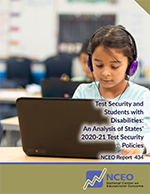Test security is a vital component of ensuring exam score validity. Another vital component of score validity is the provision of accessibility features and accommodations for students who need them. States have test security policies and procedures that are designed to ensure fairness, validity, and confidentiality, and to prevent cheating. However, there is a need to consider the ways in which test security measures may affect accessibility for some students with disabilities.
A NCEO report, Test Security and Students with Disabilities: An Analysis of States’ 2020-21 Test Security Policies, provides a snapshot of how students with disabilities, accessibility and accommodations, alternate assessments, and other related issues were addressed in states’ test security policies. The analysis found that many states described specific procedures to address testing irregularities or incidents related to the provision of accommodations or the participation of students with disabilities. State security policies most commonly addressed three topics related to accommodated tests: training requirements related to accommodations (41 states), the role of the individualized education program (IEP) team in determining which accommodations to administer (43 states), and the security of tests and materials for accommodated tests (44 states). Many states’ test security policies specifically addressed both the general summative assessment and the alternate assessment based on alternate academic achievement standards (AA-AAAS).
The reported concluded with several suggestions:
- States should have plans in place for following up on testing irregularities and incidents, with specific information on testing irregularities in the provision (or non-provision) of accommodations.
- States should ensure that all test administrators and accommodations providers receive training on how to maintain test security while providing access for students with disabilities.
- States should have test security policies in place for situations where test administrators or accommodations providers may need to access the test prior to administration (e.g., to prepare for sign interpretation, to make adjustments to test materials, etc.).
- States should annually review their test security policies and procedures to ensure that they adequately address security issues related to the use of any embedded access tools and accommodations that are provided on computer-based tests.

